
Eugene Burnand Museum, Moudon
Frédérique Burnand's lecture, August 17th 2014: a centenary
Eugene Burnand and World War I

Some dates:
Eugene Burnand was born in Moudon on August 30, 1850.
In 1861 the family moved to Schaffhouse .
He studies in German .
1870 Discovery of his artistic vocation, confirmed by the reading of the works of Lavater (1740-1801) on the knowledge of men by their physiognomy.
Franco-German War of 1870-1871
"At the age of 21, while studying architecture in Zurich, he came in contact with soldiers, French internees in Switzerland (February 1871), the bourbakis. I have always loved France, especially the French soldier. His "chic" look, his baggy trousers, his gaiters in particular, have made me dear since my early years. In Schaffhausen, I had to be used to defending them vis-à-vis the young worshipers of Germany. My father travelled in France and told me about the wonders of Paris; we have a number of relatives in Montpellier; my brothers are in France; I speak French; I like the style the French; I love their drawings, their illustrations; I admire their good taste; their figure captivates me; the French eye, what can be seen more beautiful! And the French women! I will talk about it no more .... (ref 1) Rene Burnand. Eugene Burnand l'homme l'artist et son oeuvre. Paris, Berger-Levrault)
1871: meeting Julia Girardet (1854-1921)
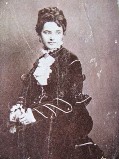
Paul's daughter, engraver, sister of Eugene (1853-1907) and twins Jules (1856-1938) and Leon (1856-1936), all painters and established at Versailles. November 1872: studies in Paris , at the School of Fine Arts and in the studio of Louis Jean Gerome From then on, his life will be essentially in France, between Paris and the South, notably Montpellier where his two elder brothers live: Ernest, industrialist, and Adrien, banker. Frequent stays abroad (especially in Italy, for painting "countryside") and returns to Switzerland.
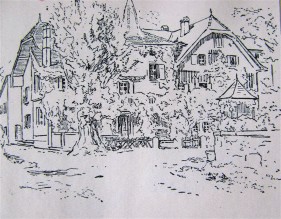
1878: 29 July: Marriage
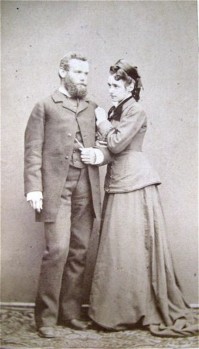
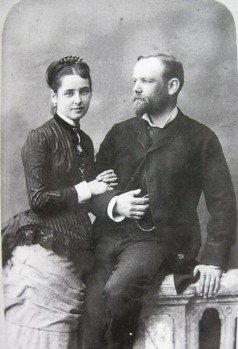
Honeymoon in the Val d'Anniviers, installed themselves in Versailles , where the Girardets reside, his in-laws.
The couple will go on to have 9 children of whom the first dies at an early age: six boys and two girls.
All boys will, in various capacities, be involved in Mobilization. 1893 named Knight of the Legion of Honour.
1895 Beginning of the religious orientation of his painting.
1911: elected as a corresponding member of the Institute (Academy of Fine Arts).
In 1914, about 30,000 people lived in Paris, artists, bankers and engineers, workers and employees. "During the first months of the conflict, the number of Swiss nationals is decreasing rapidly. Many are returning to the Confederation, either by military obligations or to flee the threat of fighting. But many remain and are organized around patriotic, charitable or professional associations such as Union Helvetia for hotel employees. In this sector, the number of nationals increases even from 1915/1916 when young Swiss come to occupy the places left vacant in the hotels and restaurants of the capital by the mobilized men.
Assassination of Jean Jaurès 31st July 1914
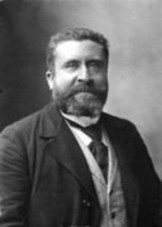
EB returns from a two-day "hop" to Paris: he works on the publication of Fioretti, a book dedicated to the life of Saint Francis of Assisi.
But events in Europe, far from being indifferent, upset him: he must note what is happening, express his point of view, as he did, to his sons, during the Dreyfus affair (big school notebook, unpublished). But he left all his business in Paris! He puts his hand on a "rentier" (account book) of one of his ancestors, in one of the many cabinets of Seppey: it has a good half of its leaves blank! He turns it over and starts.
His War Diary (JDG) begins August 1, 1914.
NB: This JDG was deemed lost by specialists (see Kaenel, X. Boniface), but it is cited by Rene, who had it in his possession.I am convinced that it must exist somewhere. It is not in the archives. So where? At Seppey, at the "chateau" where Eugene lived from 14 to 17, and where his son René kept the paternal archives. With the agreement of my cousin-owner of the place, for several hours I search everywhere in the most uninviting corners. And here's what I find, in a corner separate from the attic cupboards, at the bottom of a crate where piles of books of all kinds ("pockets", school books) are piled up that the mice and the martens had begun to nibble quietly:
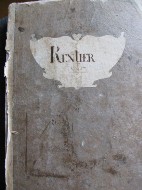
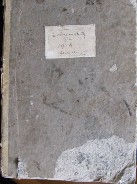
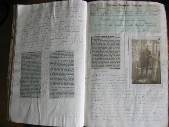
1st August:
Eugene reacts to the assassination of Jaurès to whom he had a great admiration and he loved: This great voice, generous, ardent, passionate about peace and fraternity, symbolically extinguishes at the moment when violence will triumph.
1st August 1914:
Germany declares war on Russia. Mobilization in Switzerland: 220,000 men of fighting age (up to 48) are affected. Horses are requisitioned at Moudon.
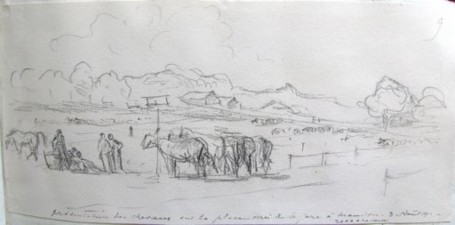
Four of the Burnand (Reservist) sons rejoin their unit in Switzerland. Franz, the elder, a pastor, is not mobilized. Tony, a medical student in Paris, leaves for involvement in France.
2nd August: France mobilises.
EB states his admiration for the calm of the population and his firm resolve to do his duty.
3rd August 1914:
Germany declares war on France. Here everything breathes peace and confident repoise in this happy corner of the country. And during this time blood may be flowing already in the French countryside.
4th August:
It is curious to note the universal antipathy of the German nation. Instinctively the people feel that it is on her that the responsibility of the state of tension that reigns in the world rests . [...] and perhaps forget too much that there is behind this arrogant and brutal front a whole people, hardworking and simple and good - a whole socialist or socialist-Christian proletariat, which has no responsibility for the present situation.
10th August:
What will happen in Switzerland if one breed crushes the other? We must expect difficult times for the confederal spirit.
August 12 :
We know almost nothing. The news contradicts itself. Censorship is exercised on the press, even at home. - It is the return to primitive life - if not to barbarism.
19th September 1914:
Bombing of the cathedral of Reims by the Germans.
EB writes a protest letter to the Gazette de Lausanne. It is published.
Humanity left to itself, to its only instincts, to its only resources: violence, perseverance, true hatred and passion lead it. Only France casts a reassuring light on the terrible chaos. There is neither pride nor ambition, but a splendid love.
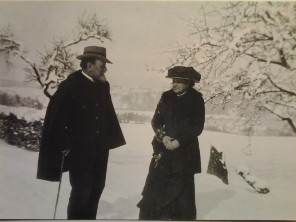
Cut from his base and his Parisian studio, from the beginning of 1915, he works in particular on Face and profiles of us (series never edited).
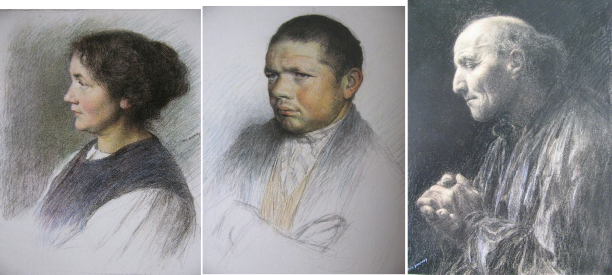
NB: At that time, according to the Liber Veritatis (the catalog he holds of his paintings), he is the author of about 170 paintings (oils).
In July 1915, General Ulrich Wille wanted to see the Confederation go to war alongside Germany. This comes after a controversy over the Peace of Berne (the Federal Council takes power from the military)
In January 1916, the affair of the colonels broke out.

On that date, two German colonels admitted that they had transmitted to the German and Austrian military attaches in Bern information about the Allies
EB recounts in his JDG the growing gap between these two events, between German-speaking Switzerland and French-speaking Switzerland on the one hand, and between the socialist parties (many demonstrations throughout Switzerland) and the right-wing parties on the other hand: in German-speaking Switzerland, the Federal Council and the government (Germanophile! while in French-speaking Switzerland and especially in Payerne, even a Sonderbund is being considered if the colonels have not resigned, which could lead France to make French-speaking Switzerland or the Canton of Vaud an additional prefecture: an idea that seems to seduce many Vaudois, in Moudon, Lausanne or elsewhere.
But this last hypothesis makes EB sit up. Here is what he writes:
20th February: God knows I love France - but I consider it extremely light and even criminal to formulate such thoughts. I think that if we were to see our country become a French sub-prefecture (...), we would regret bitterly our independent existence. [There follows a criticism of Lausanne becoming a caricature of Paris] Fortunately, there is at home the healthy element of the country. The attitude of the people of Vulliens is good to observe. [...] there is a good common sense.
At the end of February 1916, the two colonels were dismissed in court (= acquitted) and sentenced only to a slight disciplinary penalty.
Eugene is scandalized and notes:
We who love France, who know it as generous and loyal, are humiliated and overwhelmed. While being beaten, threatened with being crushed, our great state acted as "informer". Hateful role, inexpiable fault ... Violation of a sacred duty!
In June 1916, he receives this telegram [which is pasted at the very end of his JDG along with other various documents.]
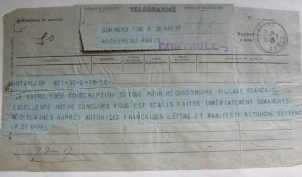
But he never says a single word about his initiative or its result in his writings.
And, in July, returning to the colonels' case, he notes:
Our people are divided. The last session of the chambers was agitated and ended in equivocation and discomfort: We returned to an incident unveiled in March by Welsches deputies: We would have taken [at the highest military level = General Will] measures to militarily occupy French-speaking Switzerland in the event that the acquittal of the colonels caused disorder!
Will 1917 be the year of peace?
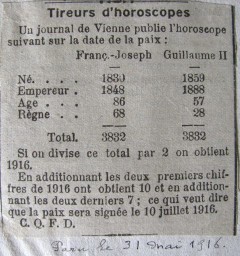
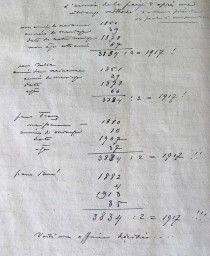
"Minister Lardy ( Charles-Edouard, a native of Neuchâtel and doctor of law at the University of Heidelberg, Germanophile assumed (as is still a part of the Swiss government and army - at least until 1917), in post in Paris 4 ) would attach the greatest value to your permanent collaboration in visiting the German prison camps in France. Are you willing to accept this charity mission? All fees will be paid, apart from the salary that will be fixed. come see us if willing to leave."
Visit to Bern on February 23: he met with Minister Alphonse Dunant (1869-1942) (Head of the Department of Federal Politics [= Foreign Affairs] Diplomate - Attaché of Legation in Berlin, Rome and Paris - Minister of Switzerland in Buenos Aires (1910-1917) - Will be Minister of Switzerland in France (1917-1938), replacing Lardy - Doctor of Political Science (Heidelberg, 1894), but Francophile - Nephew of Henry Dunant ( 1828-1910), the founder of the Red Cross).
Back to Seppey, after, it is assumed, long personal reflection and discussion with Julia, Eugene refuses the mission in a long letter (that he dictates to Julia in his Diary).
on the following grounds: 1. His personal sympathy for France
One of his sons (Tony) + other close relatives are engaged in the French army
He does not want to live in the distance of his family
His age (67 years).
Informed of his refusal, M. Lardy wrote to him from Paris begging him to accept his appeal.
Beginning of a period of agitations and uncertainties, numerous consultative correspondence exchanged with friends who have very different opinions. Eugene balances between yes and no. This is not the sign of a cautious and pusillanimous temperament: it is for him a real case of conscience that tears him apart, both in his affinities and in his faith.
Friend of France above all, happily approved by her, these are rather special conditions for a delegate from Switzerland in charge of German interests. I do not know where I am. [...] I run in Bern, spend hours at the Federal Palace. I am shown files relating to the claims of internees and [German] prisoners . My embarrassment is increasing. [I would like] a precise indication of God's will.
March 1917: Revolution in Russia. 16th: Abdication of the Tsar.
I feel immense joy. It is the end of absolutism and the rotten regime that raged in Russia. Huge and bright perspectives.
He will add later in the margin: The following has shown that it was necessary to fall back.
April 1917: entry into the war of the United States
Eug. receives a letter from the Swiss embassy in Paris which assures him that, in accordance with the conditions it poses for a possible acceptance of the mission:
His reports will be communicated to the French Government
He will not be required to sign the reports sent to the German Govt. and that
There is his collaboration.
April 23: My mission in Paris
The die is cast. [...] There would be cowardice to refuse now. I feel in order, accepting. God will provide. He will deign not to induce me into a temptation of cowardice. He will give me his help, the wisdom, the restraint, the tact, the skill that I can miss in so many circumstances.
"On the 27th of April, we leave Julia and I for Paris, accompanied by Verena ( their servant ), we restore in the middle of the war our Parisian home, 10 rue Denfert-Rochereau" [in LV] He goes to Mr. Lardy's house, and is received as an official who comes to take his service . This disarms him, he has the impression of being fooled and he immediately finds all his scruples. Back home, I am the object of an assault in all the rules from my 4 Parisian sons (Marcel, Daniel, David and Tony), Marcel in particular who sees me with great anxiety to advance in this diplomatic adventure which our relations will ignore the meaning and which threatens to make our position difficult in France.
Doubts, malaise, re-consultations with many French friends.
Léonce Bénédite - [director of Luxembourg, whom we will see again later] observes. "As a corresponding member of the Institute [NB = Academy of Fine Arts to which he was elected in 1911], you can not assume this function undeniably the responsibility of the German authorities."
This argument really seems to me like the pole extended to the drowning man. I take it, the party is taken. I can not inspect France on behalf of Germany.
At the beginning of June, he goes to his superiors and gives them his decision: he is quite badly received by Lardy ...
But at the foot of the Embassy building, religious scruples suddenly assail him. He seems to hear the voice of Christ saying to him: "I was in prison and you did not visit me". He goes back at once and makes himself available to Lardy for the duration of a month. He felt compelled to perform this act of obedience. His proposal is declined...
These ups and downs of internal struggles [...] marked this truly dramatic period of my life. My health has seriously affected [bronchopneumonia]. According to his doctor son René, all this nearly finished him : I go to bed most of the months of May and June.
When he learned that he was being deprived of the diplomatic passport he had been given for his mission to Paris, he wrote an ulcerated letter: How? He can not even keep it? This would be the least compensation for all the hassle caused him this painful case !?
And it was restored to him!
"But there was also a good side to this failed campaign." [in LV] This whole mission story is essential for the future: "My presence in Paris allowed me to set my hand to my series of Poilus long in the making [...], but that my removal from France had forced me to defer. It is in November 1915 that the idea came to me to offer a publisher (Berger-Levraut) a series of "military types" treated in a very different spirit from the one that inspired by images published by the illustrated newspapers."
He will paint the men with dignity, with truth, soaked in what each of these beings has lived, and carries in their faces, white or colored, from here or from elsewhere, male or female (nurse), simple soldier or high-ranking.
Eugène Burnand, now free from his moving around, will immediately devote a lot of energy to the realisation of this project, and this for several years, until the end of his life.
Back to Sépey in June 1917
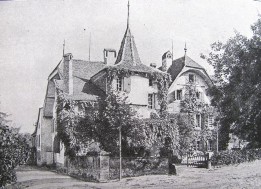
Eug. like many, think that the end of the war is near. But everyone does not share his opinion:
"July 27: en route to Vevey by car, invited by Mr. Abdy, an Englishman who had been brought to us by Colonel Goff. [...] My "authorized advisers" think that the time has come to withdraw definitely in Switzerland. The view of the Vevey suburbs and the train station district is a real fright!
No, it is not yet time for retirement ... And France, Montpellier in particular, and the pines of Aleppo, and scrubland ... and the "Poilus" call me. My party is therefore inclined to spend the winter, as formerly, in the countryside of L'Herminier, in Montpellier. Interrupted during the summer months, following the great illness that had stopped me in my tracks during my stay in Paris, I was planning to resume my work in the autumn.This very ardent desire was granted."
NB: interruption of the JDG from October 3, 1917 to July 28, 1918
"The work was interrupted in the summer of 1918 because of our usual stay in Sepey, to where on July 9 we move - and where we are about to celebrate our wedding anniversary, the anniversary of our 40 years of marriage!" [in LV]
July 28, 1918 : I now have 45 types in my box: French, Senegalese, Hindu, Fijians, - Arabs of all kinds, Serbs, Russians, Martiniquans, Moroccans, Chinese, Japanese, Somalis, etc. ... this work is fascinating, I only dream of returning to the path of heroic France to complete the work begun.
November 11, 1918:
Armistice, end of the war
On November 16, 1918 ,
after having again witnessed the armistice festivities, overflowing, noisy, dazzling (in Marseilles), we take the road back to Paris. As soon as we had moved back to our apartment, our two twins had so nicely dressed for our return - I was looking for new models.
December 1918:
Spanish flu in Europe Daniel's death; Eugene's illness.
The War Diary stops on September 21, 1918 and does not resume until
August 30, 1919 (date of the entry of E in his 70th year).
These are the ending lines:
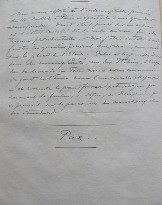
We attended the indescribable day of July 14 in Paris. Show of unparalleled grandeur. David was perched on a tree where he had settled since the night before, facing the presidential platform. I was sitting at a window in the American headquarters, overlooking Place de l'Etoile. Julia and the twins were in the Crete offices, rue des Italiens, at the corner of the boulevards. All of us shared from the depths of our souls with universal joy - and felt the great patriotic thrill that shook the crowd, so dignified, so disciplined, that pressed on the course of marshals and standards!
The work on the series of portraits of the Allies in the war of Nations will occupy Eugene until the end of his life.
February 4, 1921: death of EB
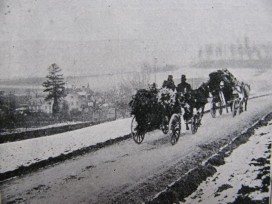
In 1923, the collection of portraits will be purchased from EB's family by an American patron, Mr. Cromwell, who will donate it to France, with the condition that it be exhibited in unity, ie in its entirety.
After a vast politico-administrative muddle that involved the President of the Republic, it is at the beginning of the 30s that the public will be able to see these portraits displayed in the Museum of the Legion of Honor, in Paris, where they will remain.
Bibliography:
Eugène Burnand, Journal de guerre , autograph manuscript (quoted in italics)
Eugène Burnand, Liber veritatis , autograph manuscript (quoted in italics in quotation marks)
René Burnand, Eugene Burnand, l'homme, l'artiste et son oeuvre, Berger-Levrault, Paris, 1926
Philippe Kaenel, Eugène Burnand peintre naturaliste, MCBA, Lausanne, 2004